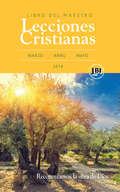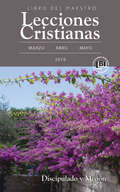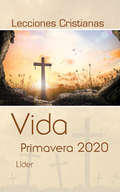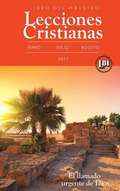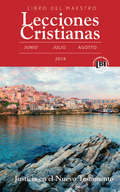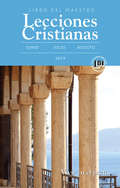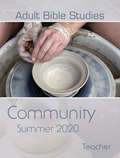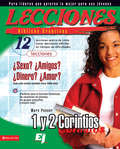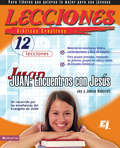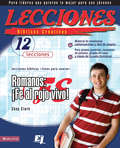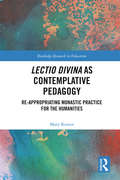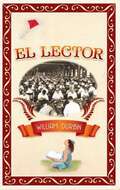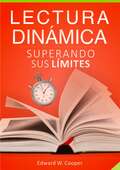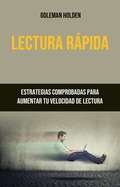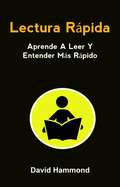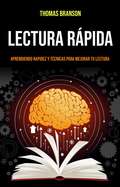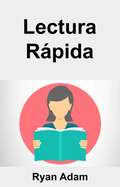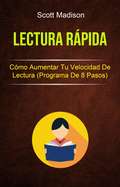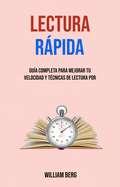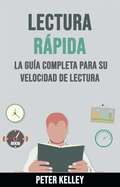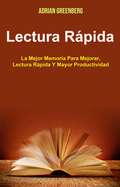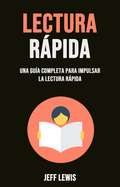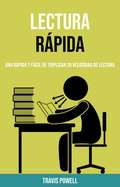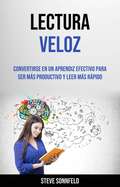- Table View
- List View
Lecciones Cristianas libro del maestro trimestre de primavera 2018 - eBook [ePub]: Spring 2018 Teacher Book
by Heidi ArencibiaLecciones Cristianas tiene como propósito ayudar a las personas adultas hispanas a crecer en su comprensión de la Biblia y relación de ésta con la vida. Lecciones Cristianas sigue la serie de las Lecciones Bíblicas Internacionales. Está escrito especialmente para las iglesias de habla hispana. También hay un Libro del Maestro que provee sugerencias importantes para la enseñanza de cada lección, preguntas para discutir y actividades para la clase. Lecciones Cristianas helps Hispanic adults grow in their knowledge of the Bible and how it relates to their lives. Lecciones Cristianas follows the International Lesson Series. The content of this excellent study is biblical and it is written especially for Spanish-speaking churches. The teacher book provides valuable suggestions for teaching the class, discussion questions, and class activities.
Lecciones Cristianas libro del maestro trimestre de primavera 2019: Spring 2019 Teacher Book
by Heidi ArencibiaLecciones Cristianas tiene como propósito ayudar a las personas adultas hispanas a crecer en su comprensión de la Biblia y relación de ésta con la vida. Lecciones Cristianas sigue la serie de las Lecciones Bíblicas Internacionales. Está escrito especialmente para las iglesias de habla hispana. También hay un Libro del Maestro que provee sugerencias importantes para la enseñanza de cada lección, preguntas para discutir y actividades para la clase. Lecciones Cristianas helps Hispanic adults grow in their knowledge of the Bible and how it relates to their lives. Lecciones Cristianas follows the International Lesson Series. The content of this excellent study is biblical and it is written especially for Spanish-speaking churches. The teacher book provides valuable suggestions for teaching the class, discussion questions, and class activities.
Lecciones Cristianas libro del maestro trimestre de primavera 2020: Vida
by Aida Irizarry Fernandez Diana Hynson Karina FelizLecciones Cristianas está escrito especialmente para las clases de adultos de habla hispana. Tiene como propósito ayudar a las personas adultas a crecer en su comprensión de la Biblia y la relación que tiene con la vida. El libro del líder provee sugerencias, preguntas para discutir y actividades importantes que ayudarán a hacer mejor la enseñanza de cada lección. Nuevas lecciones cada trimestre. Lecciones Cristianas helps Hispanic adults grow in their knowledge of the Bible and how it relates to their lives. The content of this excellent quarterly study is written especially for Spanish-speaking churches. The leader guide provides valuable suggestions for teaching the class, discussion questions, and class activities.
Lecciones Cristianas libro del maestro trimestre de verano 2017: Summer 2017 Teacher Book
by Yolanda Pupo-OrtizLecciones Cristianas tiene como propósito ayudar a las personas adultas hispanas a crecer en su comprensión de la Biblia y relación de ésta con la vida. Lecciones Cristianas sigue la serie de las Lecciones Bíblicas Internacionales. Está escrito especialmente para las iglesias de habla hispana. También hay un Libro del Maestro que provee sugerencias importantes para la enseñanza de cada lección, preguntas para discutir y actividades para la clase. Lecciones Cristianas helps Hispanic adults grow in their knowledge of the Bible and how it relates to their lives. Lecciones Cristianas follows the International Lesson Series. The content of this excellent study is biblical and it is written especially for Spanish-speaking churches. The teacher book provides valuable suggestions for teaching the class, discussion questions, and class activities.
Lecciones Cristianas libro del maestro trimestre de verano 2018: Summer 2018 Teacher Book
by Fabiola Grandon-MayerLecciones Cristianas tiene como propósito ayudar a las personas adultas hispanas a crecer en su comprensión de la Biblia y relación de ésta con la vida. Lecciones Cristianas sigue la serie de las Lecciones Bíblicas Internacionales. Está escrito especialmente para las iglesias de habla hispana. También hay un Libro del Maestro que provee sugerencias importantes para la enseñanza de cada lección, preguntas para discutir y actividades para la clase. Lecciones Cristianas helps Hispanic adults grow in their knowledge of the Bible and how it relates to their lives. Lecciones Cristianas follows the International Lesson Series. The content of this excellent study is biblical and it is written especially for Spanish-speaking churches. The teacher book provides valuable suggestions for teaching the class, discussion questions, and class activities.
Lecciones Cristianas libro del maestro trimestre de verano 2019: Summer 2019 Teacher Book
by Aida Irizarry FernandezLecciones Cristianas tiene como propósito ayudar a las personas adultas hispanas a crecer en su comprensión de la Biblia y relación de ésta con la vida. Lecciones Cristianas sigue la serie de las Lecciones Bíblicas Internacionales. Está escrito especialmente para las iglesias de habla hispana. También hay un Libro del Maestro que provee sugerencias importantes para la enseñanza de cada lección, preguntas para discutir y actividades para la clase. Lecciones Cristianas helps Hispanic adults grow in their knowledge of the Bible and how it relates to their lives. Lecciones Cristianas follows the International Lesson Series. The content of this excellent study is biblical and it is written especially for Spanish-speaking churches. The teacher book provides valuable suggestions for teaching the class, discussion questions, and class activities.
Lecciones Cristianas libro del maestro trimestre de verano 2020: Comunidad
by Aida Irizarry Fernandez Lucia Martinez Betty GonzalezLecciones Cristianas está escrito especialmente para las clases de adultos de habla hispana. Tiene como propósito ayudar a las personas adultas a crecer en su comprensión de la Biblia y la relación que tiene con la vida. El libro del líder provee sugerencias, preguntas para discutir y actividades importantes que ayudarán a hacer mejor la enseñanza de cada lección. Nuevas lecciones cada trimestre. Lecciones Cristianas helps Hispanic adults grow in their knowledge of the Bible and how it relates to their lives. The content of this excellent quarterly study is written especially for Spanish-speaking churches. The leader guide provides valuable suggestions for teaching the class, discussion questions, and class activities.
Lecciones bíblicas creativas: 12 lecciones acerca de cómo hacer decisiones difíciles en tiempos de dificultades
by Marv Penner¡Perfecto para la Escuela Dominical, las reuniones de jóvenes, los grupos pequeños y mucho más! ¿Sexo? ¿Amigos? ¿Dinero? ¿Amor? Todo esto existía también hace 2000 años. Los adolescentes cristianos del siglo veintiuno enfrentan en una buena medida la misma situación que enfrentaron los creyentes del siglo primero en Corinto: una sociedad indulgente, libertina y que busca la satisfacción personal. Siendo lo último en la serie de Lecciones Creativas, Lecciones Bíblicas Creativas en 1 y 2 de Corintios es un plan de estudios de 12 lecciones con asuntos orientados en torno a nuestra fe en el mundo real. El mismo permite a los adolescentes lidiar con la tensión que surge entre las enseñanzas bíblicas y la realidad cultural. Estas 12 lecciones acerca de los no-tan-facilemente-domesticables creyentes de Corinto y su pastor fundador Pablo de Tarso, ayudarán a los encargados de grupos de jóvenes, líderes juveniles y maestros de Escuela dominical, a enseñar a jóvenes en edad secundaria acerca de la conversión, las transformaciones, los fracasos, el liderazgo, la autoriad y acerca del amor constante y salvador de Dios, al cual podemos acudir aun cuando, como seres humanos que somos, tendemos a arruinarlo todo. Esta es una muestra de los temas que explorarás a los largo de esta serie de estudios bíblicos sobre 1 y 2 Corintios: - Dame libertad o dame amor - Los amigos no dejan que sus amigos sigan adelante sin ser perdonados - Esas dificiles desiciones sexuales - Es Amor es… - No hay respuestas sencillas - Dinero, cuando te quiero - ¡Auch!
Lecciones bíblicas creativas: Encuentros con Jesús
by Janice Ashcraft¡Haga del aprendizaje algo entretenido con estas lecciones bíblicas creativas! ¿Quiere enseñar verdades bíblicas sólidas a sus muchachos sin que sus ojos se «pierdan» cuando dice las palabras: «Abran sus Biblias»? Con este libro, ahora es posible. Janice y Jay Ashcraft, especialistas veteranos en vida familiar y jóvenes crearon doce lecciones interesantes y listas para usarse que realmente pueden hacer que sea divertido profundizar en la Escritura. Los Ashcraft utilizan técnicas creativas de aprendizaje para estimular el interés de los jóvenes y mantenerlos activamente involucrados en cada lección, entre las cuales se incluyen: -juegos de aprendizaje -discusiones -parodias, melodramas y diálogos -investigaciones «de profundización» -hojas de trabajo interactivas -mucho más. Estas lecciones son claras, fáciles de usar y completas. Con este libro podrá incluir enseñanza bíblica creativa en su agitado horario de trabajo.
Lecciones bíblicas creativas: ¡Fe al rojo vivo!
by Chap ClarkConsidérelo como un conciso y excente curso de doctrinas bíblicas, sin sermonear, pero con muchas opciones, música y dramatización y trabajo en grupos pequeños. Contiene hojas de trabajo para fotocopiar que tienen diseños atractivos a la vista y de contenido espiritual profundo. En las doce claras y completas lecciones de este libro, Chap Clark guía a los jóvenes (y a usted) a través de las Grandes Ideas contenidas en esta carta a los cristianos del primer siglo, quienes hacían hasta lo imposible para tener vidas piadosas en una cultura impía. Estos son asuntos a la orden de día para los jóvenes que viven en los albores del siglo veintiuno. De cualquier forma en que lo use, este libro es su apasionante entrada a la sana doctrina bíblica. Enseñe romanos con estas sesiones o escoja lo que quiera de los diálogos creativos, hojas de trabajo y otras opciones para personalizar una lección.
Lectio Divina as Contemplative Pedagogy: Re-appropriating Monastic Practice for the Humanities (Routledge Research in Education #16)
by Mary KeatorOffering an original application of the ancient monastic practice of lectio divina to the humanities, this book demonstrates the need for further emphasis on deep reading, reflection, and contemplation in contemporary university classrooms. Each chapter provides readers with an historical overview of the four movements of this monastic method: lectio (reading), meditatio (interpreting), oratio (responding), and contemplatio (experiencing wisdom), and suggests ways to incorporate these practices in humanites courses. Keator demonstrates that the lectio divina method is a viable pedagogical tool to guide students slowly and methodically through literary texts and into a subjective experience of wisdom and meaning.
Lectio Divina as Contemplative Pedagogy: Re-appropriating Monastic Practice for the Humanities (Routledge Research in Education #16)
by Mary KeatorOffering an original application of the ancient monastic practice of lectio divina to the humanities, this book demonstrates the need for further emphasis on deep reading, reflection, and contemplation in contemporary university classrooms. Each chapter provides readers with an historical overview of the four movements of this monastic method: lectio (reading), meditatio (interpreting), oratio (responding), and contemplatio (experiencing wisdom), and suggests ways to incorporate these practices in humanites courses. Keator demonstrates that the lectio divina method is a viable pedagogical tool to guide students slowly and methodically through literary texts and into a subjective experience of wisdom and meaning.
Lector
by William DurbinThirteen-year-old Bella wants to be a lector just like her grandfather, who sits on a special platform in the cigar factory, reading great novels, the newspaper, and union news to workers as they roll the cigars. Being a lector is an important role in their immigrant community. But the hard times of the Depression mean that Bella must go to work in the factory; her hope of getting the education a lector needs seems impossible. Meanwhile, the factory workers and owners clash. People lose jobs, innocent workers are arrested, and the Ku Klux Klan prowls the area. And then there are those amazing new radios showing up all over town. Could the radio take the place of the lector? Bella must decide her own future and help her people preserve their history. Bella's lively, warmhearted story captures the color and flavor of Ybor City as it explores an intriguing part of our American history.
Lectura Dinámica: Lea mejor y más rápido con técnicas de lectura dinámica y fijación (Para el estudio y el placer)
by Edward W. CooperSupere sus límites de lectura. 1 libro al día ... 1 libro por hora ... ¿Qué es realmente posible? Para algunos esto ya es una realidad, para otros es pura ficción. ¿Qué diferencia hay entre ellos? ¿Cuáles son los secretos ocultos detrás de las famosas técnicas de lectura rápida. En este libro descubrirá cada una de las técnicas en detalle, de una manera práctica y enfocadas a aumentar su velocidad de lectura y mejorar su comprensión. Cuando se trata de lectura veloz, no existe una técnica milagrosa. De manera clara y directa verá la realidad de la situación, cómo superar sus límites actuales y comprenderá las limitaciones existentes, sus puntos positivos y negativos. La lectura dinámica se convertirá en una valiosa herramienta en su vida personal y profesional que hará de usted un lector profesional y estudiante inigualable. Imagínese leer un libro a la semana o incluso al día. Para algunos esto sería bueno, para otros fantástico. ¡Usted decide donde quiere ir, el camino lo encontrará en este libro!
Lectura Rápida: (124) Estrategias probadas para mejorar tu velocidad de lectura
by Goleman Holden¿Qué tan rápido puedes leer esta descripción? La mayoría de la gente lee a paso lento, no siempre porque queremos sino porque no sabemos leer más rápido y entender el texto que estamos leyendo. La lectura es un gran escape del ritmo de la vida cotidiana. La conferencia se convertirá en una cantidad de tiempo increible en sus actividades diarias, y estoy seguro que todos hemos deseado, al menos una vez, poder aumentar su velocidad de lectura para dedicar menos tiempo en sus tareas o para lograr más en un día de trabajo. Aprender el proceso paso a paso para desarrollar su habilidad y también cómo hacer un seguimiento de su progreso, La lectura es inutil sin la capacidad de recordar lo que lee. Este libro se encuentra en la lectura rápida como una experiencia gratificante con la capacidad de comprender y recordar la información de forma inmediata y significativa. No espere más para descubrir su clave para una vida nueva y mejor.
Lectura Rápida: Aprende Cómo Leer y Entender Más Rápido
by David HammondUn sistema totalmente único de ejercicios de lectura rápida especialmente creados para hacer que te resulte sencillo leer frases completas de una vez, lo cual te permite concentrarte en grandes ideas, en lugar de solo palabras, lo que, a su vez, te permite aplicar los talentos visuales y conceptuales de tu cerebro derecho a tu lectura. La Lectura de Velocidad te enseñará como funciona la mente humana y cómo usarla correctamente a fin de leer del modo más eficiente posible. Al aprender las técnicas, ejercicios y estrategias contenidos en este libro, serás capaz de triunfar en tus estudios, impresionar en las reuniones de negocios anuales, y completar cualquier tarea en un tiempo récord.
Lectura Rápida: Aprendiendo Rapidez Y Técnicas Para Mejorar Tu Lectura
by Thomas BransonEste libro combina algunas de las ténicas más poderosas para la lectura rápida junto con el método que te enseña cómo recordar y retener la información que lees. ¡Ahora puedes reducir tu tiempo de estudio! Lo que te tomaba horas ahora solo te toma minutos luego de aprender estas técnicas. Esto se conoce como comprensión lectora, que puede ser definido como el nivel de entendimiento de un mensaje o contenido. La comprensión lectora está basada en más que saber lo que significa cada palabra en el texto, o lo que dirá el texto completo; significa obtener la esencia de todo el mensaje que el contenido intenta transmitir y saber cómo sentirse y actuar al respecto. ¡Compra tu copia ahora!
Lectura Rápida: Como aprender cualquier cosa más eficientemente Resultados Inmediatos
by Ryan AdamEste libro lo ayudará a acceder a su velocidad de lectura actual y rastrear su progreso mientras sus habilidades mejoran. Aprenderá técnicas esenciales de lectura rápida, ejercicios, y estrategias para disminuir su tiempo de estudio, dominar su concentración y ganar un eje competitivo en sus compañeros de clase, ser un líder en su campo, y tomar su negocio al siguiente nivel. Un soldado recibiendo una orden o un piloto volando largas distancias. Un factor común el cual conduce a la productividad en nuestras vidas diarias es la concentración. Irónicamente, no le damos tanta atención como deberíamos a esta parte crucial de la experiencia humana. Cometemos errores en nuestros juicios y nos encontramos a nosotros mismos en posiciones peligrosas como una consecuencia de esos momentos cuando nos distraemos. En este libro, estará expuesto a maneras de quitar las máscaras a personas tomando una visión interrogativa a los individuos que se esconden bajo ellas. Obtenga este libro hoy.
Lectura Rápida: Cómo Aumentar Tu Velocidad De Lectura (Programa De 8 Pasos)
by Shawn JonesEn realidad, la lectura rápida comenzó como parte del entrenamiento militar para identificar los aviones de guerra enemigos. Los pilotos utilizaron una herramienta de marcapasos llamada taquistoscopio que mostraba imágenes ante sus ojos a velocidades crecientes. Esto permitió a los pilotos identificar rápidamente los aviones enemigos para atacar cuando fuera necesario. Con los cientos de posibles aviones que se podían utilizar en el ámbito militar, esta rápida identificación fue literalmente la herramienta que marcó la diferencia entre la vida y la muerte. La lectura rápida tiene muchos usos prácticos en un mundo tan ajetreado como el actual. Puede ayudar a alguien a avanzar en su carrera, a hacer que un estudiante universitario complete sus estudios de postgrado, o a hacer que la lectura sea una experiencia más agradable y significativa. Para entender el texto es necesario mover los ojos para poner la fóvea en la parte del texto que se desea enfocar. La agudeza disminuye notablemente fuera de la fóvea y no se pueden discriminar las palabras y el texto lejos de la fóvea. Por lo tanto, ese es el factor limitante, como es también la rapidez con la que el cerebro puede procesar la información.
Lectura Rápida: Guía Completa Para Mejorar Tu Velocidad Y Técnicas De Lectura Por
by William BergEste libro te enseñará cómo hacer precisamente eso. Ahora, al utilizar las técnicas de este libro, no solo aprenderá a usar la lectura veloz, sino que también aprenderá cómo puede aumentar su comprensión de lo que está leyendo. No se equivoque al respecto, ya que no hay resultados positivos instantáneos. Lo que aprenderá de este libro son herramientas que puede usar para producir resultados de aprendizaje positivos graduales y constantes. Si bien puede llevar tiempo aplicar las cosas que aprenderá aquí, un poco de paciencia garantizará que todo saldrá bien al final. ¿Está abrumado por la cantidad de material escrito que enfrenta cada día? ¿Encuentras que pasas la mayor parte del día revisando memorandos, informes, artículos, libros y sitios web que son críticos para tu éxito, pero que agotan tu tiempo y energía? Lectura rápida podría ser la respuesta. ¿Que estas esperando? ¡No esperes más! ¡Desplácese hacia arriba y haga clic en el botón comprar ahora para comenzar el viaje a la vida de sus sueños!
Lectura Rápida: La Guía Completa Para Su Velocidad De Lectura
by Victor J. Ramirez E.Leyendo la guía completa para Acelerar tu lectura Este libro puede ayudarlo a darse cuenta de que no tiene que aceptar la velocidad con la que lee ahora. En su lugar, puedes entrenarte para mejorar tu capacidad de leer rápido y comprender la informacion que estás absorbiendo.
Lectura Rápida: La mejor manera de mejorar tu memoria y lectura
by Adrian GreenbergTodas estas técnicas pueden ayudarte en varias áreas de tu vida. Desde mejorar tus prospectos en carreras, hasta salvar tiempo, sin contar el hecho de que te podrás mantener al día, con la gran cantidad de información que es presentada en nuestra vida cotidiana, con esta guía podrás maximizar tu tiempo efectivo. Este libro es una herramienta, no solo para lectura textual, sino para lectura corporal, te harás consciente de tu propio lenguaje corporal, aprenderás a leer y analizar acciones no verbales. ¿Alguna vez sentiste que aquella cita fue buena o si no lo fue? ¿A tu jefe le importa tu opinión o solo espera a que te vayas de la sala, para empezar a aceptar ideas? Existen muchas citas no textuales que dicen mucho, atreves de movimientos corporales sutiles. Todos somos capaces de ver y leer estas acciones. Así que la motivación y la determinación son los aspectos más importantes de la lectura rápida. La compresión es tu habilidad de procesar por completo el contenido de cualquier lectura rápida, así que asegúrate de no solo leer por encima una vez que aprendes la habilidad de la Lectura Rápida
Lectura Rápida: Una Guía Completa Para Desarrollar la Lectura Rápida y Comprensiva
by Jeff LewisLas estrategias descritas en este libro ayudarán al lector a desarrollar una forma muy precisa de analizar la comunicación no verbal de las personas. La información proporcionada en este libro es fácil de entender, sencilla para leer y te ayudará a comprender la comunicación no verbal. Este proceso no es nada complicado, y ciertamente para nada ilegal; es una psicología simple que al aprender las herramientas adecuadas y los disparadores que puedes utilizar, te permite aumentar drásticamente tus conversaciones sin cambiar nada más sobre tu producto o su valor. Es una regla de escritura común asignar un párrafo para cada idea y colocar primero la información más significativa. Por lo tanto, la mayoría de las veces verás la información clave en la primera oración de un párrafo ideal. Alternativamente, los párrafos también pueden llevar la idea principal en la última oración, que también sirve como resumen. ¡Desplázate hacia arriba para obtener tu copia hoy!
Lectura Rápida: Una Rápida Y Fácil De Triplicar Su Velocidad De Lectura
by Travis PowellLectura rápida: Una rápida y fácil de triplicar su velocidad de lectura por Travis Powell En este libro aprenderá métodos, técnicas y ejercicios diseñados para mejorar la velocidad de lectura de manera dramática y lo más importante, cómo retener la información más fácilmente. Esto puede ir en contra del sentido común, pero las técnicas de "La paradoja de la lectura rapida" le harán retener más información tan rápido como usted la lea. Usted debe estar en el camino correcto si realmente no quiere que su esfuerzo y tiempo se pierda en el entrenamiento mental. Los conceptos y métodos de entrenamiento mental, le mejora de la memoria, la lectura rápida y aprendizaje súper rápido que se presentan en este libro deben conducirlo en la dirección correcta. Desde adelantarse a una discusión con su pareja, hasta asegurarse de poder ganar la próxima promoción en el trabajo! Al leer las situaciones y analizarlas, usted podrá responder apropiadamente y evitar cualquier momento de uy! Si estás listo para tomar acción y cambiar tu vida para bien, este libro definitivamente te guiará en la dirección correcta!
Lectura Veloz: Convertirse En Un Aprendiz Efectivo Para Ser Más Productivo Y Leer Más Rápido
by Steve SonnfeldEste libro te guiará a través de todos los pasos necesarios para convertirte en el lector veloz que siempre has soñado ser. Desde ideas básicas como minimizar las distracciones mientras lees, hasta planes y prácticas estratégicas para llevar tus habilidades de lectura al siguiente nivel, este libro te dará la información que necesitas para convertirte en un exitoso lector veloz. Este libro te enseñará algunas maneras rápidas y fáciles de triplicar su velocidad de lectura en muy poco tiempo. Al centrarse en estas técnicas y practicarlas con el tiempo, puedes convertirte en un maestro de la lectura rápida. La lectura rápida es una habilidad que todo el mundo debería tener, no sólo te ayudará a comprender mejor los libros que lees, sino que también te ayudará en tu lugar de trabajo, desafortunadamente no muchas personas pueden leer a gran velocidad, lo que no solo significa que leen libros más despacio, sino que también puede perjurdicarlos en la vida personal y en el trabajo. Si estás preparado para hacer algo al respecto y cambiar tu vida para mejor, ¡este libro definitivamente te guiará en la dirección correcta!
